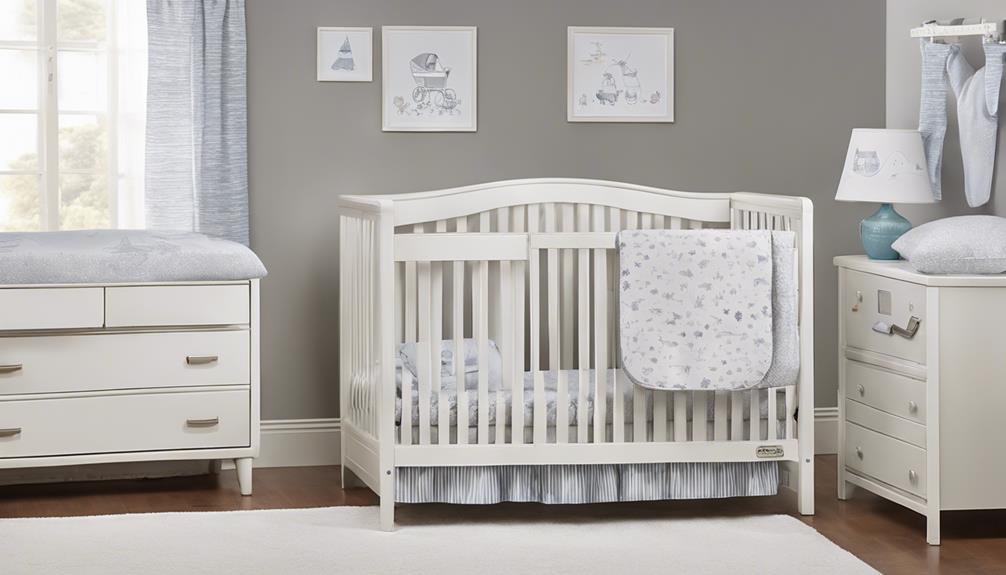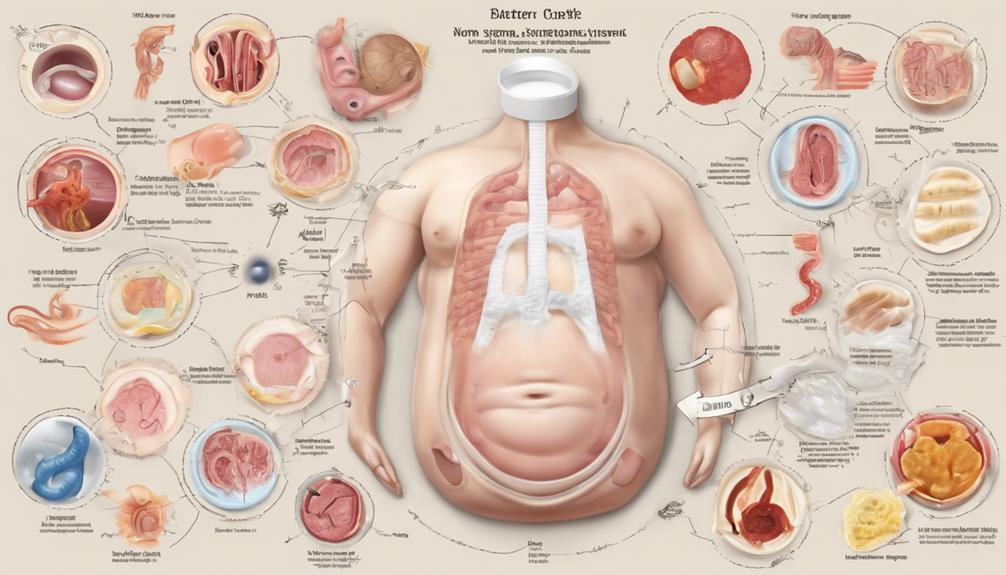When it comes to caring for your newborn, making their safety and health a top priority is essential. Ensuring that we wash our hands thoroughly before handling the baby, providing proper support for their delicate head and neck, and securing them safely are just the first steps.
But what about creating a nurturing environment that fosters growth and development? Join us as we explore essential steps to guide you through this incredible journey of nurturing and caring for your little one.
Key Takeaways
- Establish a consistent feeding schedule for your newborn's health and growth.
- Maintain diapering and hygiene practices to ensure your baby's comfort and well-being.
- Use soothing techniques like rocking and swaddling to calm your newborn.
- Create a safe sleep environment by following recommended practices to reduce SIDS risk.
Newborn Feeding Schedule
When caring for your newborn, understanding and following a consistent feeding schedule is important to make sure their nutritional needs are met and promote healthy growth and development. Newborns typically need to be fed every 2-3 hours, totaling 8-12 feedings in a 24-hour period. Breastfed babies may consume 1-2 ounces per feeding in the first few days after birth, while formula-fed babies might require 2-3 ounces to meet their needs. It's important to pay attention to hunger cues such as rooting, sucking on hands, or increased alertness to know when your baby is ready to feed.
Consulting with a healthcare provider is essential to receive personalized recommendations tailored to your baby's specific growth and needs. Your healthcare provider can offer guidance on adjusting the feeding schedule as your newborn grows and make sure they're getting the right amount of nourishment at each feeding.
Diapering and Hygiene Tips
Maintaining proper diapering and hygiene practices is essential for keeping your newborn clean, comfortable, and healthy. Diapers should be changed around 10 times a day to prevent diaper rash and guarantee cleanliness. When changing diapers, using fragrance-free wipes is gentle on your baby's skin, and applying diaper cream as needed helps prevent irritation. Remember to wipe your newborn from front to back, especially for baby girls, to avoid any potential infections. Proper disposal of diapers in a sealed trash can is vital for maintaining a hygienic environment in your home.
Setting up a designated diaper changing station with all the essentials such as diapers, wipes, and diaper cream can streamline the process and make it more convenient for you. Keep everything within arm's reach to avoid leaving your baby unattended during diaper changes. By following these tips, you can make sure that your newborn stays fresh, clean, and free from diaper-related discomfort.
Soothing Techniques for Newborns
To guarantee your newborn's comfort and well-being, implementing soothing techniques can be beneficial in helping them settle and relax. Newborns can often feel overwhelmed and comforting them is essential for their development and happiness.
Here are some effective soothing techniques to try:
- Gentle Motion: Utilize gentle rocking or swaying motions to calm a fussy newborn. The rhythmic movement can be soothing and help your baby relax.
- White Noise: White noise machines or sound apps can create a calming environment for your newborn, making it easier for them to drift off to sleep.
- Pacifier: Offering a pacifier can help satisfy your baby's natural sucking reflex and provide comfort when they need it most.
- Swaddling: Swaddling can mimic the snug feeling of the womb, making newborns feel secure and cozy, promoting better sleep and relaxation.
Creating a Safe Sleep Environment

Wondering how to guarantee your newborn sleeps safely? When it comes to creating a safe sleep environment for your baby, there are essential steps to follow.
To start, always remember to place your newborn on their back to sleep. This simple action greatly reduces the risk of Sudden Infant Death Syndrome (SIDS).
Keep the crib free from loose bedding, pillows, or soft toys that could pose suffocation hazards. Maintaining a comfortable room temperature is important; make sure it's not too hot or too cold for your little one.
Use a firm mattress in the crib to provide a safe sleeping surface for your newborn. Co-sleeping should be avoided to reduce the risk of accidental suffocation or SIDS.
By adhering to these guidelines, you can create a secure sleeping environment that promotes your baby's safety and well-being.
Bonding and Interaction With Your Baby
Ensuring a strong bond with your newborn involves engaging in activities like skin-to-skin contact, talking, and singing to promote emotional connection and development.
Skin-to-skin contact helps regulate the baby's temperature and heart rate, promoting bonding and emotional security.
Talking and singing to your baby aids in language development and strengthens the parent-child relationship.
Engaging in tummy time sessions enhances your baby's neck and shoulder muscles, supporting physical development.
Monitoring your baby's developmental milestones allows you to track progress and seek professional guidance if needed.
By prioritizing self-care, you can be more important and attentive to your baby's needs, fostering a healthy caregiving environment.
Frequently Asked Questions
What Are the 5 Steps of Newborn Care?
We guarantee newborns sleep on their backs to reduce SIDS risk and feed them every 1-3 hours, observing hunger cues. We uphold hygiene by changing diapers frequently and monitor for signs of illnesses. Establishing bedtime routines helps with sleep patterns.
What Is the Routine Care of a Newborn?
We guarantee a newborn's well-being through establishing routines like frequent feedings, regular diaper changes, monitoring temperature, and seeking healthcare advice. Our care revolves around sleep, nutrition, hygiene, health checks, and vaccinations for their healthy development.
How Do You Take Care of a Newborn Baby Alone?
Taking care of a newborn alone requires patience, organization, and self-care. We guarantee a safe sleep environment, use baby gear for convenience, rest during nap times, prioritize self-care, and seek support from loved ones or community resources to navigate this journey successfully.
What Are the Do's and Don'ts for a Newborn Baby?
We've learned that supporting a baby's head prevents injuries, laying them on their back reduces SIDS risk, and keeping their sleep environment safe is important. Remember to wash hands, avoid loose bedding, and maintain a comfortable crib temperature.
Conclusion
As we navigate the journey of caring for our newborn, we're constantly learning and adapting to their needs. It's a delicate balance of providing structure and routine while also being flexible and responsive to their individuality.
Through the challenges and joys, we find ourselves growing alongside our little one, forming a bond that's unbreakable.
Let's continue to nurture, protect, and cherish this precious gift of life together.










